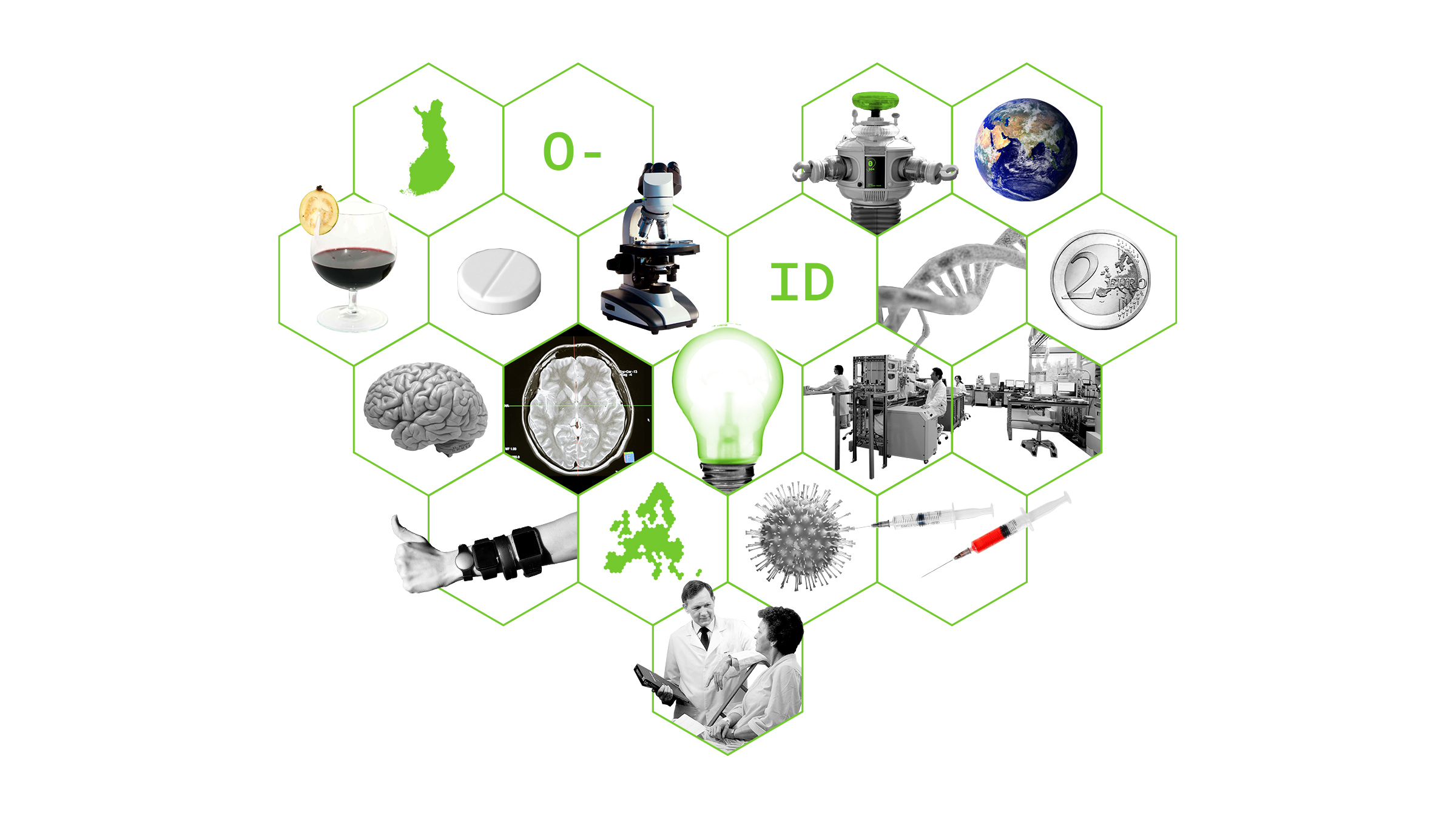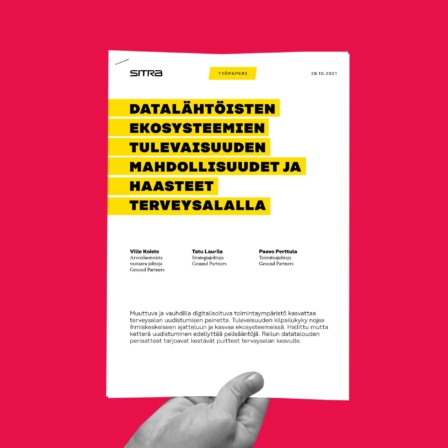The ecosystems, which can include research institutes, hospitals, companies and NGOs, share data under common rules. This accelerates the development of innovations and new services and boosts health sector growth in Finland.
Four collaborative ecosystems funded by Sitra developed approaches to medication safety and the prevention of memory disorders, a rulebook on the use of data in collaborative work between European children’s hospitals and sought ways to improve the movement of data in home care for older people.
A key feature of the projects was the use and sharing of data according to fair principles. One of the tools used was Sitra’s Rulebook for a Fair Data Economy, which provides a framework and contractual models for the smooth and secure sharing of data.
The projects built up the capacity of the participating organisations and provided lessons and recommendations that can be used to strengthen the entire sector.
From a complex operating environment towards concrete use cases
The ecosystems funded were diverse and many networks were in the process of building collaboration at the start of the projects. Those involved in the projects were highly active, kept to the timeframe and overall achieved their goals very well. The experience of participating in the projects was positive. However, six months is a short period of time to experiment with data sharing and to apply the Rulebook for a Fair Data Economy.
The ecosystems planned or carried out a concrete use case for data sharing, which helped to gain an impression of the multidimensional field of activity. Determining the broad field of operations and identifying the main stakeholders is, therefore, key to choosing the most appropriate measures and means to develop an ecosystem.
The projects particularly highlighted the need to identify and acknowledge complexity, as collaboration and the ability to see the big picture takes time and do not happen in a vacuum. This complexity was reflected in the interactions and dependencies between ecosystem areas and parties, which required adaptation and solution orientation.
Recognising complexity is important in order to solve problems it raises arising from it through a concrete use case. A use case helps to delineate the original problem, model the movement and use of data, the relationships between different stakeholders and to visualise the end value for users and stakeholders.
Sitra’s rulebook is versatile, could be further developed
The projects increased understanding of data-sharing ecosystems and created a basis for their further development. All of the projects applied Sitra’s Rulebook for a Fair Data Economy and increased proficiency in the use of data. The rulebook is a practical guide for those building collaborative networks and provides ground rules and contractual models for data-sharing networks.
You might also be interested in
It was possible to apply the Sitra’s Rulebook for use by data ecosystems, but based on the projects, it can be said that it is still a relatively unknown tool for those operating in the health sector. The ecosystems encouraged making the rulebook more widely known.
Applying the rulebook’s contractual models to the health sector required much effort. It required an in-depth knowledge of legislation as there are detailed regulations on the processing and disclosure of health data. The rulebook should also discuss more extensively ethical aspects and related issues, as these are important in the health sector.
However, the rulebook helped to identify essential aspects, such as the description and administrative model of the data-sharing network, and to outline fair rules. The rulebook was versatile and could be applied to the situation and needs of different ecosystems.
Drivers to boost ecosystem operations
There was a positive spirit in all ecosystems, and collaboration ran smoothly. The projects highlighted the role of the driver, the ecosystem co-ordinator, and the importance of being active in the promotion of the project, in “keeping the ball in the air”.
As in all project work, clear approaches, roles and ground rules were seen as essential to shaping the operating culture of the network, even if a lack of hierarchy is a key characteristic of an ecosystem.
Another important role of the driver was to give a voice to all parties and to ensure that there was a balance within the network and that all points of view were taken into account. As many of the ecosystems were still in relatively early stages, it may be that this role was emphasised. It is important to note that roles can change over time.
Trust is built together
Building trust between the parties operating in the network takes time and is a prerequisite for good collaboration. In this respect, the ecosystems had slightly different starting points: two networks were reconfigured at Sitra’s suggestion during the funding negotiations, and some projects involved parties that did not receive any funding. The ecosystems rose to the challenge admirably and trust was built, even among previously unknown partners.
Trust, both within the ecosystem and in relation to external parties, is one of the key success factors of an ecosystem and is reflected in its activities, even if it is difficult to articulate and prove. Collaboration and good communication go a long way.
Legislation as a boundary condition for secondary use of health data
The projects revealed that the main challenges in data use and value creation are not technical but rather related to regulation, resources and skills. Technical platforms and the requirements for data portability are feasible. But siloing and regulatory barriers hamper the scope for using data and AI, for example in disease prevention.
The European children’s hospitals project found that the General Data Protection Regulation (GDPR) General Data Protection Regulation (GDPR) Regulation (EU) 2016/679, the European Union’s ("EU") new General Data Protection Regulation ("GDPR"), regulates the processing by an individual, a company or an organisation of personal data relating to individuals in the EU. Open term page General Data Protection Regulation (GDPR) and its divergent application in different EU Member States, due to varying interpretations, makes collaboration on data sharing difficult. The EU Court of Justice of the European Union has yet to make a ruling that would guide interpretation.
In the joint meetings of the ecosystems, topics of lively discussion included developments at the national level and the Data Protection Authority’s interpretations regarding health data (compare well-being data produced by sports applications), the Act on the Electronic Processing of Client Data in Social and Healthcare Services and the application of the GDPR.
Solutions were seen in the form of legislative reform within the national margin for manoeuvre and EU-level harmonisation over the long term, for example in connection with the future European Health Data Space Data space A set of mutually agreed principles and rules for sharing and exchanging data within or between different sectors. Open term page Data space (EHDS).
Recommendations: from ecosystems to a national ecosphere
Finland has pioneered important solutions to promote digitalisation in the health sector. In the future, the use of digital services and data will be even more important so that well-being services counties can cope with the growing demand for social and healthcare services as the population ages.
Health-sector ecosystems in Finland tend to be regional. The four projects funded by Sitra have made a valuable contribution to data-sharing ecosystems. The networks should use their strengthened expertise to advance their development and value creation. The workshops and meetings held as part of the projects helped focus on critical issues related to data sharing and sharing experiences and lessons learned across ecosystem boundaries. However, the projects ended before concrete collaboration between the ecosystems was achieved.
A national forum or network is needed for ecosystem collaboration to enable the long-term development of their operations, solutions and synergies. Finnish ecosystems seem to be fragmentary and different parties are largely siloed. A systematic approach to the promotion of network growth and development potential still seems to be missing. Co-ordinated national action could increase inter-ecosystem collaboration and proficiency and enable more efficient service delivery in partnership with the private sector.
Our healthcare system faces huge challenges. Finland should develop a comprehensive data and ecosystem policy both to reap the benefits of the data economy and to respond to increasing public health challenges in a complex landscape.
You might also be interested in
In addition to ecosystems, we need a national ecosphere – comprehensive vision, co-operation and action – for the innovation, co-creation and implementation of systemic solutions in the health sector. It is difficult for individual parties and individual ecosystems to achieve these goals alone.



